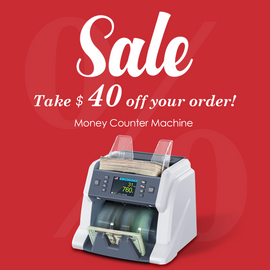Money counting is an essential part of banking and one of the most frequent activities that bank tellers have to do. Knowing how to count money accurately and quickly is critical for any bank teller, since it helps them provide excellent customer service and protect their employer from losses due to errors. In this article, we’ll look at the different techniques and tools used by bank tellers to accurately count money. We will also discuss the importance of accuracy and precision when counting money and some tips on how to improve your money-counting skills.
What are the Different Techniques for Counting Money?
There are several different techniques that bank tellers can use to count money. The techniques for countiing money chosen depends on how much money needs to be counted, how fast it needs to be done, and the type of money being counted.
The first technique is called tally counting. This method involves counting out the total number of each denomination of currency and then adding up the totals. For instance, if a teller is counting $100 in bills, they would count 10 $10 bills, 10 $5 bills, 10 $1 bills, and 10 quarters. This method is very accurate, but it can be time consuming, especially when counting large amounts of money.
The second technique is called stack counting. This method involves placing all of the bills in neat stacks and then counting them based on the denomination of each stack. For example, if a teller is counting $100 in bills, they may put 10 stacks of 10 $10 bills, 10 stacks of 5 $5 bills, and so on. This method is much faster than tally counting, but it is not as accurate and can lead to errors if the stacks are not uniform.
The third technique is called machine counting. This method involves using a machine to quickly and accurately count large amounts of money. There are two types of machines that are commonly used by banks: coin counters and bill counters. Coin counters are designed to count coins quickly and accurately, while bill counters are designed to count paper money. Both machines can count large amounts of money quickly and accurately, but they can be expensive to purchase and maintain.
Why is Accuracy and Precision Important When Counting Money?
Accuracy and precision are essential when counting money. Bank tellers must ensure that each denomination of currency is counted correctly and that the correct amount of money is given to customers. Errors can be costly for banks, so it is important that tellers count money accurately and quickly.
Here are some errors that bank cashiers may make:
- Not classifying money by denomination or currency when counting, leading to confusion or mix-ups.
- Not recording or verifying the amount when counting, resulting in discrepancies or omissions.
- Not following the bank's rules or procedures when counting, resulting in violations or negligence.
- Not properly storing or packaging banknotes when counting, leading to damage or loss.
- Not confirming or obtaining a signature from the customer when counting, resulting in disputes or complaints.
In addition, accuracy and precision are important for preventing fraud and other criminal activity. If bank tellers are not careful when counting money, criminals could try to take advantage of the situation by slipping counterfeit bills or extra coins into transactions. Accurate and precise money counting can help banks reduce the risk of fraud and other crimes.
Tips for Improving Your Money Counting Skills
There are several tips that bank tellers can use to improve their money-counting skills. Here are a few of the most important ones:
- Practice regularly: Regular practice is the best way to become proficient at counting money. Try counting out different amounts of money using the various techniques discussed above. This will help you get comfortable with counting money and learn to recognize different types of currency.
- Use the right tools: Make sure you are using the right tools for each job. For instance, use a coin counter for coins and a bill counter for bills. This will help you count quickly and accurately.
- Pay attention to details: Details are important when counting money. Make sure to pay close attention to the denominations and numbers of each type of currency. This will help you avoid errors and ensure accuracy.
- Double check your work: Always double check your work after you’ve finished counting. This will help you catch any mistakes and make sure you’ve counted correctly.
Conclusion
Counting money is an important part of banking, and it is essential that bank tellers do it accurately and quickly. Knowing how to count money correctly can help banks reduce losses due to errors and prevent fraud and other criminal activity. Furthermore, it can help banks provide excellent customer service. By following the tips outlined above, bank tellers can improve their money-counting skills and ensure accuracy and precision.







